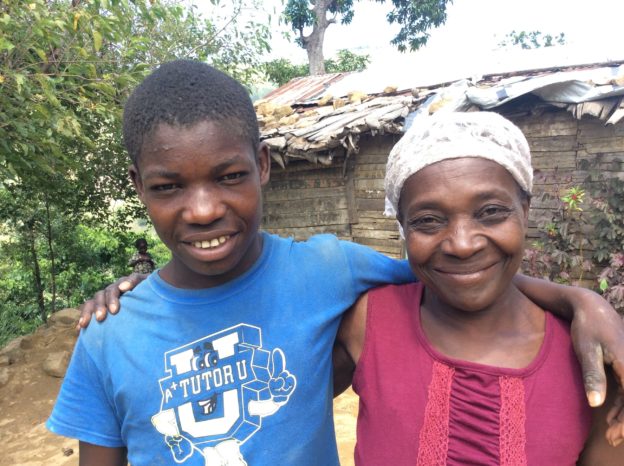Idalia seems as though she might be about 40, but like most of the women from this new group, she doesn’t know her age. When she’s asked why she thinks she was invited to join the program, she says that it was because of her problems. But she knows that everyone has problems, so when pressed, she explains: “Tout moun konn mouye, men gen ki mouye plis.” “Everyone is wet sometimes, but some are wetter than others.”
She grew up in Beken, and community in the larger, western section of Savanette. Her mother had six girls and five boys, but lost five of the children. Neither she nor any of her siblings went to school, but they never knew hunger. Her parents farmed as sharecroppers, but they worked their own land too. They also kept livestock. “My parents worked really hard.”
She lives now in Gwo Labou with her husband and the youngest two of her four children. They met at church when they were young, and her husband sent his parents to her parents’ home to formally ask for her hand. They struggled, but they got by. “Le w malaria, ou pa jam san pwoblèm,” she explains. They farmed their land, growing plantain that she’d bring to market for sale. She also maintained small business selling rum in Jinpaye, where they lived. “When you’re poor, you’re never without problems.” Now and again, they’d be able to keep a goat.
They moved to Gwo Labou recently. They were driven away from Jinpaye, the remoter mountain community where they had been living. Her husband was accused of stealing a bunch of plantains out of a neighbor’s garden.
She claims that her husband was innocent, that there was no proof, only suspicions. She went to complain to the local KASEK, the elected official responsible in some measure for law and order in the countryside, and he told her that wives don’t speak on their husbands’ behalf. So they fled, fearing for the man’s life.
And that’s not her only problem. Her oldest son is in prison in Port au Prince. They are staying in a cousin’s home for now. Their case manager, Titon, will have to help them figure out a more permanent solution.
Idalia is happy to chat and able to explain the various lessons that Titon has already gone over with her. She remembers the points that they’ve gone over well. She can talk about the care of her goats and about Vitamin A.
She doesn’t have a clear plan for the future, but she has hopes. She wants to add to the livestock we’ve given her. She’s not sure what she’ll buy, but explains that “everything has its own price.” What you buy depends on what you have to spend.
